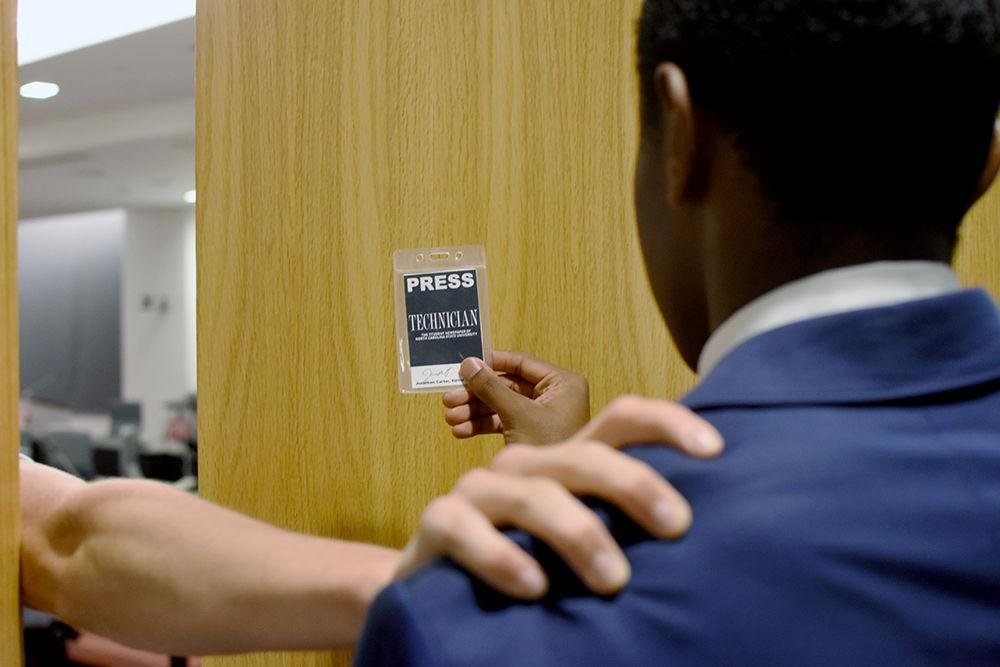During the Government Relations and Oversight committee meeting (GRO) on Tuesday, reporters from Technician were removed during closed deliberation and voting on whether probable cause existed to continue investigating into the punitive charges against Student Body Treasurer John Taylor Willis.
The motion to move into a closed session during deliberation was made by Sen. Coleman Simpson, a third-year studying agricultural education and political science, and was unanimously voted in the affirmative by the committee.
Per NC State Student Government statutes, “All meetings of public bodies shall be open to all North Carolina State University Students, except as the closing of meetings is permitted by the General Statutes of North Carolina. Permissible reasons under state law include: (a) To prevent the disclosure of information that is privileged or confidential according to federal, state, or local law; (b) To prevent premature disclosure of awards; (c) To preserve the attorney client privilege; (d) To consider the appointment or removal of an individual to or from a non-public body; (e) As otherwise provided for by the Student Body Statutes.”
Visiting senators and Student Government advisers were permitted to remain in the room during the time of committee deliberations.
“It’s a precedent that has been set by this body,” said Justine Hollingshead, assistant vice chancellor and Student Government Treasury Department adviser, following the motion being voted upon. “And it also is permissible to go into executive session, which would be closed-door, for the committee to deliberate.”
Per North Carolina statute 143-318.11.(c) “Calling a Closed Session. – A public body may hold a closed session only upon a motion duly made and adopted at an open meeting. Every motion to close a meeting shall cite one or more of the permissible purposes listed in subsection (a) of this section. A motion based on subdivision (a)(1) of this section shall also state the name or citation of the law that renders the information to be discussed privileged or confidential.”
No legal reasoning for moving into closed session was cited by the committee, despite Technician asking for clarification on three separate occasions.
Student Senate President Mitchell Moravec, a fifth-year studying psychology and materials science and engineering, believes that the motion was conducted lawfully, due to section 143-318.11.(a)(6) of the North Carolina General Statutes.
“I think a mistake was made that the motion did not specifically cite that subsection before they approved the motion,” Moravec said, referencing the subsection. “But ultimately, I think it was all good and legal because we used one of the exceptions to the open meeting law that I felt and that we had gotten the advice from our advisers that was good to go for this purpose.”
The subsection referenced by Moravec says that a closed session is lawful “to consider the qualifications, competence, performance, character, fitness, conditions of appointment, or conditions of initial employment of an individual public officer or employee or prospective public officer or employee; or to hear or investigate a complaint, charge, or grievance by or against an individual public officer or employee.”
The subsection also states, “a public body may not consider the qualifications, competence, performance, character, fitness, appointment, or removal of a member of the public body or another body and may not consider or fill a vacancy among its own membership except in an open meeting.”
Sen. Ryan Dunn, GRO committee chair and a second-year studying political science, says that he was advised on the legality of moving into a closed session prior to the meeting.
“Before going into the meeting, Justine was on the phone with General Counsel asking about it, and when she got off the phone, she said General Counsel said it would not be a problem for us to move into closed session,” Dunn said.
Hollingshead declined to comment on the meeting.
General Counsel didn’t respond for comment by the time of publication.
Mike Hiestand, attorney and legal consultant to the Student Press Law Center, sent this statement to Technician via email:
“It’s certainly a lousy way to kick off the school year,” Hiestand said. “Open meetings laws exist for a reason. They are reflected in the student government’s own constitution and they’re not optional. You can’t just re-write them as you go. If you’re going to work as a student government representative on behalf of the students at NC State, you have agreed to abide by rules that help your constituents keep tabs on what you’re doing. That’s how it works. I hope they’ll get their act together going forward.”








